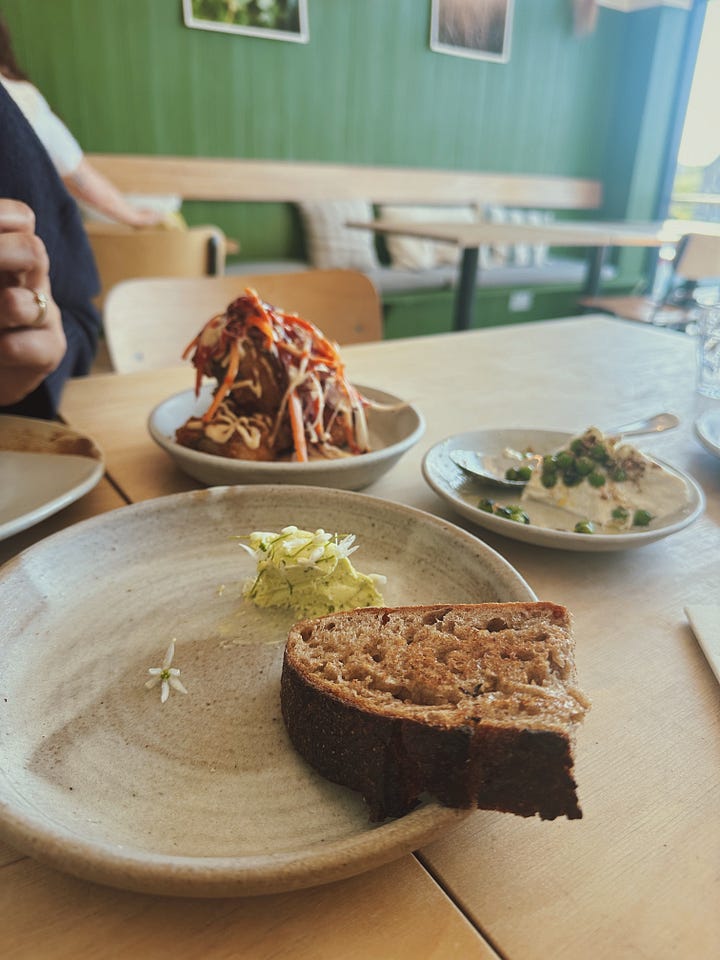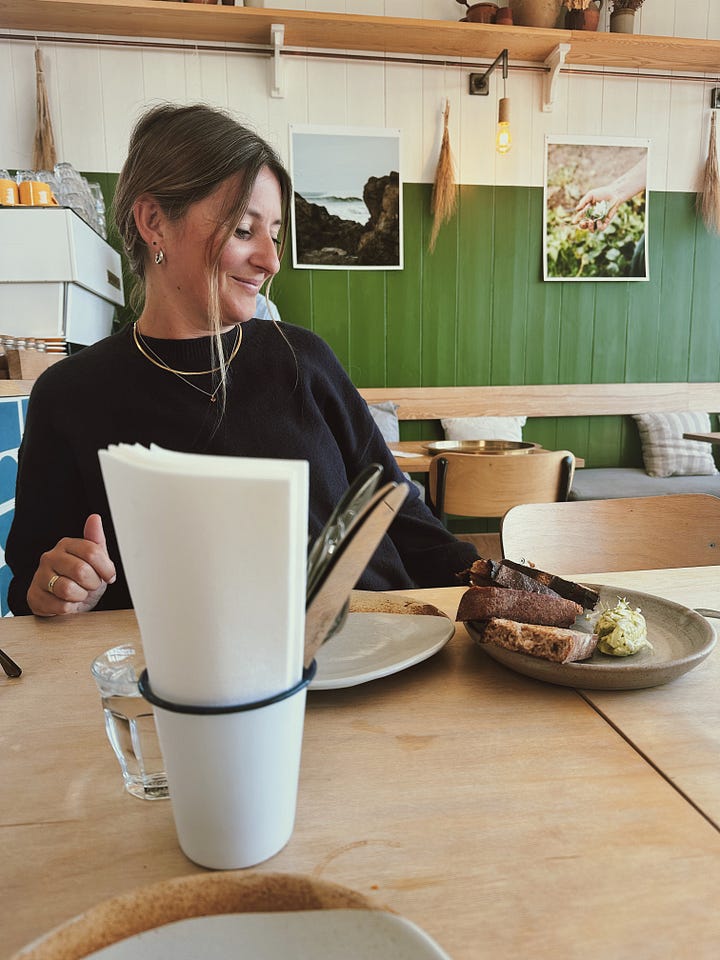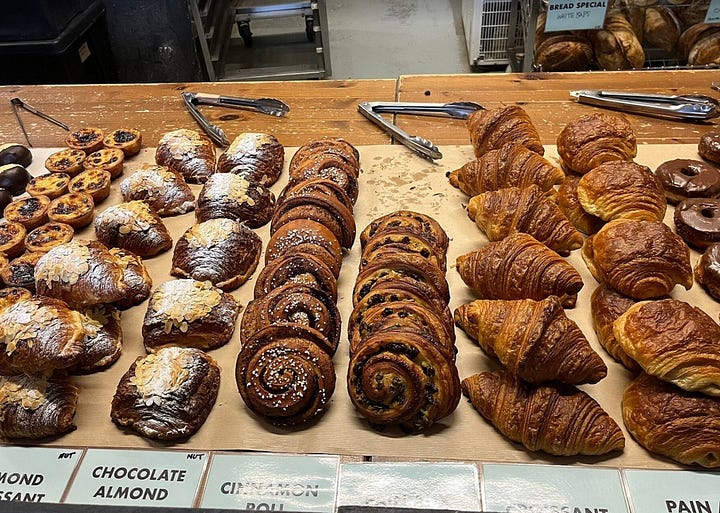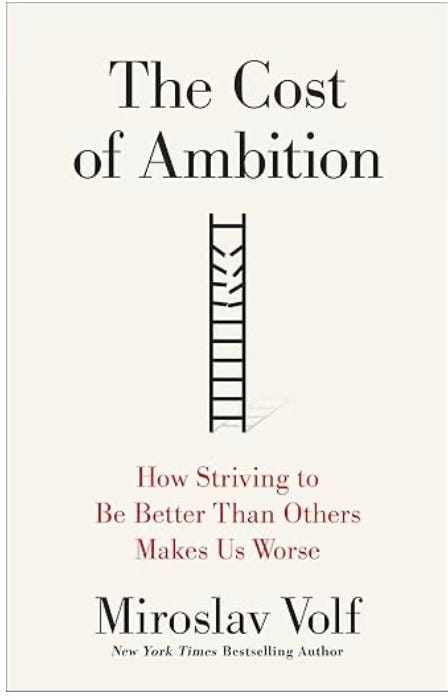The Lectio Letter - Issue #94 - A Domestic Monastery in a World of Chaos
“I've learnt to become deeply suspicious of advice which leads Christians to create too much distance between our inner life and some kind of outer performance.”
…
“[Our] calling is not to pretend to be a saint but to actually become one, to become one all the way down.”
…
A great temptation in our Christian lives is to spend much more effort on "seeming to be", rather than "becoming".
…
“But deep discipleship to Jesus cannot be like a low golf handicap; only possible for professionals, the rich and retirees.”
…
“ Jesus meets us where we are, as we are, to draw us into becoming more than we are, to become more like Him.”
— Quotes from this Issue’s article entitled “A Domestic Monastery in a World of Chaos”
Welcome to Issue #94 of the Lectio Letter. This members-only newsletter is filled with music, film and food suggestions, links, and an article written by yours truly.
Greetings from my sick (not quite) bed! I had very much hoped to send this out a week ago, but then I came down with the flu! I’m glad to report, I’m on the mend ;)
The picture above is of Bellapais, an abandoned ancient Christian monastery in the contested quasi-nation state of Northern Cyprus that we visited last year. An abandoned place of worship in a complicated and fraught political situation is a good metaphor for the subject of this Lectio Issue.
When life feels busy, we can daydream about escape. For some, it’s planning a holiday, others a new job, but when the desire to live a life of deep discipleship comes up, I’ve often dreamt of becoming a monk (as long as I can stay married to Rachel, I should add)!
In my admittedly romanticised daydream, the idea of dedicating all of your time to a life with God seems like it would remove all the obstacles to the deeper sense of relationship I long for. But that kind of escape isn’t a real or even appropriate option for most of us, including me. So, in this Issue, I’m reflecting on the great challenge of deepening a life in God in the midst of a busy and chaotic world.
Many of those who teach and encourage deep discipleship, even if they aren’t in a cloister, live lives of relative privilege in the area of time and resources. When faced with a world which has increased the burden of our attention and energies to a place of overwhelm, the invitations to discipleship to Jesus can feel like just another one of the things we don’t have time for. But I’m wondering if it’s possible to live in a domestic monastery. A life in the World but still marked by a deep and abiding life in Jesus. Maybe it’s possible?
Whether you become a paid subscriber or not, I’m very grateful to each of you who read and respond to this newsletter.
PSA: This email is LONG and due to some obscure technical reasons on Gmail it gets ‘clipped’, which means you are not seeing the whole thing.
You can see at the bottom of the email if it says “message clipped”, then click “View entire message” to see it all.
You are not getting it all if you don’t see my signature at the bottom.Alternatively, if you don’t want to read this in your email, you can use the Substack app (where you can listen to the article read out) or read it online at LectioLetter.com
Status Board

The last month or so, we have racked up the miles. We flew back to the UK to see my family in light of my 40th Birthday. It was special to be with family and friends (not pictured) who have made my life possible (to coin the phrase which stood out to me in Hauerwas’ memoir I reviewed here) and the place I grew up in (pictured below).




Work
As I mentioned in our last email, we are excited to be helping to run a seminar in Lausanne, Switzerland, for two weeks in July around the life of the Apostle Paul with our friend Maureen. She has spent decades studying the Pauline texts, drawing on his motivations, practices and theology. I’m confident it’ll be a rich time.
This seminar is designed for those who are in YWAM full time, have completed a DTS and have already completed a foundational course in or are still active in staffing or leading biblical studies programmes in the University of the Nations. If you are interested, please reach out to me, or you can apply online here.
Just before we head to Lausanne, we will also be running another Children of Promise Camp here in South Africa. These have always been so fruitful in connecting with the children we see every week on Fridays in Masi, and create a fantastic environment for their walk towards Jesus to deepen. While many people have already given generously towards the running of the camp, there’s still time to help us reach our goal if you feel led to.
Reading
I just finished Brad East’s instalment of the Lexham’s Essentials series “The Church”. I first read Ben Myers’ work in this series on “The Apostles’ Creed” and was a huge fan of it. I’ve used it in multiple curricula as well as recommended it as a short form of catechesis.
I’ve read two or three of the others in this series and found them similarly excellent, although the editorial oversight seems to be quite free, as each book takes on the character of its author rather than a cohesive tone you might expect from a series like this.
Brad East’s other work has clearly influenced his writing of this one, as he mentions in the opening that there are not many of the classic ecclesiology subtitles included here. Instead, East’s main burden in the book is to write in such a way that God’s love for His people shines through.
At the beginning of the book, he reflects on Mary (which has become more common in protestant circles in the last decade) as a carrier of the gospel and its mission. Rather than beginning in Acts, where a great deal of reflection on the Church tends to begin, he moves through the story of Abraham and the people of Israel for at least half of the book. In this way, he gets to the birth of the Church in such a way that, in a compelling way, shows how the church, although grafted in as Gentiles, are also the promise and fulfilment of God’s call to Abraham and later Israel.
The last chapter, “Entrusted”, changes format and turns to a series of numbered points. They are clear and compelling, but I wondered if the change of format was due to reaching a word limit for these small books, or just a way to summarise his final thoughts. The numbered points were a useful way of considering the nature of the Church, and I’ve considered summarising and reflecting on them in future lectio issues. Brad East’s other works have drawn on Robert Jenson, Karl Barth and John Webster, and one of his previous books included a foreword by Katherine Sonderegger. All of these are ‘heavy hitter’ systematic theologians, and his work and voice are clearly influenced by the (post-liberal reformed) traditions these theologians represent. This book is well worth engaging in and is beautifully written with enough food for thought for even the most well-read on this area.
Eating
With our travel, we didn’t end up cooking all that much, so instead I’m going to share some of the best places we ate.
Cornwall
We spent some of our time in the popular holiday spot of Bude on the North Coast and came across Temple where we had a delicious lunch. They had a fantastically delicious selection of small plates which we shared, great service (not to be take for granted in high tourist traffic areas) and a beautiful ambience.


There were also some very niche South African wines we spotted on the shelf, but it was lunchtime aaaand UK prices for wine are astronomical so we declined. But we seriously recommend this spot if you are in the area.


Our second pick in Bude was Electric Bakery. Tucked away in a small industrial estate, it would have been easy to miss but once we arrived it became clear by this was a Saturday morning mecca for locals and visitors alike. The baking and coffee here are far beyond anything I’ve come across in Cornwall. Well worth looking up if you are here.
After that we headed to London and someone suggested we head to Italo Cafe. The Cafe has serious counter-culture vibes (with “F the Tories” banners hanging inside) set within Bonnington Square which has it’s own interesting history as a cul-de-sac of bygone London in an otherwise modern district. Italo’s website says: "historic Bonnington Square, [is] one of the longest surviving experiments in urban living in Europe. Many of the young idealists who squatted the neighbourhood in the late 1970s and 1980s still live here, and are often to be found hanging around, and shooting the breeze...”
While they seemingly do evening pop-ups, during the day they have two types of sandwiches based on what’s in season. They tasted fantastic and were wrapped in delightful wax paper to boot.
Listening
Xhosa Musician Jabulile Majola released this acoustic hymn during Easter weekend. It’s a song we’ve sung many times in services here but he has brought it to life in a fresh and stripped-down way.
UyiNkosi yamakhosi, uMdali womhlaba (You are Lord of lords, Creator of the earth)
Zonk’ izizwe zibabaza ubukhulu baKho (All nations extol Your greatness)
UyiNkosi yamakhosi, uMdali womhlaba (You are Lord of lords, Creator of the earth)
Zonk’ izizwe zidumisa Wena (All nations magnify You)
Upbeat Jazz combo from Badbadnotgood
Michael Kiwanuka’s effortless retro style and song writing
In a different yet still ‘throwback’ vibe is Dr Dog’s new album. The song I’ve enjoyed most so far is “Talk Is Cheap”. I first came across Dr Dog on a trip to Hawaii, where I borrowed my brother-in-law’s car early one morning in a jet lag fog. The CD he had in (yes, back when there were CDs) was left over from his high school friend, who himself was in a semi-successful touring band. It was the Dr Dog 2008 Album “Fate”. In my light fog, driving around the tropical lanes of backwoods Kailua, I was transfixed by the retro production.
Fast forward about ten years, and I was in another jet lag stupor, having flown from South Africa to Portland in Oregon. We were driving from the airport through Portland city and I glanced up at a billboard which announced Dr Dog were playing that night with ‘tickets still available’. Despite having a 24-hour journey under our belt, I couldn’t pass up the serendipity of having arrived ‘just on time’.
For reasons unknown, that only increased my great love for her, Rachel capitulated to staying up past midnight as we, with muted enthusiasm, blearrily watched their show. Driving home on the ‘wrong’ side of the road, getting lost in rural Oregon, arriving at a host home. So it’s a storied history with this music and so I’ll keep on listening.
A Domestic Monastery in a World of Chaos
At the end of a long meeting, one of the leaders of a ministry I was working with walked me to the door and asked what I was working on right now. After I listed the many things that were on my plate, he told me to remember to be a 'duck'.
I looked at him, puzzled, not having heard the expression before, and he explained: "Keep kicking furiously along under the surface and glide along serenely on the surface".
While I took the advice in, something about the disparity of managing the stresses and strains of many things on the inside while presenting a cool, calm exterior didn't sit well with me.
The Pressure to Perform rather than become
As I reflect on it now, I think it felt like the pressure to put on some kind of 'show' and over the years, I've learnt to become deeply suspicious of advice which leads Christians to create too much distance between our inner life and some kind of outer performance.
The picture of the duck, though, has stayed with me, and I think it's a good descriptor for the kind of performance pressure many people feel when pursuing a life with Jesus in our modern world.
Our Modern world expects us to be kicking furiously along with the pace of its demands. The expectations of an achievement-driven society result in unprecedented levels of anxiety for many. The pace of life, just in order to ‘keep up’ feels chaotic.
Alongside the demands of a busy world, for a Christian, there is another pressure. To live with Jesus, which includes a call to grow in living a life that looks more and more like His. A life that, instead of Chaos, is marked by a deep and abiding peace.
In between these pressures, we can too often be on one hand left feeling like sinners who have fallen short and on the other hand a pressure to present some kind of 'saintly' outer personality.
To become a Saint all the way down

The calling of the Christian life is indeed to become a saint, but not just in our outer actions, but to become a Saint all the way down. Often our surrounding culture uses the term Saint to refer to some kind of Spiritual Superhero. A person whom we can admire and elevate and even venerate, but not a person we realistically presume to be able to imitate. So what do I mean when I say we are called to become saints all the way down? Well, it’s certainly not to become a spiritual superhero.
Saints throughout Biblical and Church History are simply those who have learnt to live and love God with everything they are and to love others well as second nature. The promise of becoming a Saint is to live a life in the midst of chaos that can preserve the kind of peaceable heart that Jesus intends for us to have as an anchor in a world of hustle and hurry.
Jesus said: “Peace I leave with you; my peace I give you. I do not give to you as the world gives. Do not let your hearts be troubled and do not be afraid.” – John 14:27
As I've said already, the calling is not to pretend to be a saint but to actually become one, to become one all the way down. But what does it mean to receive and remain in the gift of peace that Jesus gives in a world of hurry and hustle?
To be a saint means that not only my actions and words, but my thoughts, affections and intuitive responses are marked increasingly and consistently by the kind of love and peace that Jesus has.
To pretend, or to simply act saintly while harbouring deep seeds of resentment, fear, or love of self, is a recipe for disaster.
A great temptation in our lives in Christ is to spend much more effort on "seeming to be", rather than "becoming". Put plainly, "Keeping up appearances" is not a fruit of the Spirit. We do not need to, nor can we, become perfect, but we do need to be on a journey of change that impacts the full depth of who we are. Discipleship is not just modifying the surface of our lives.
Throughout history, we have many examples of people who have sought out the path of sainthood. Women and Men who have desired to become saints, not for the praise of others, or even their own sake, but for God's sake. These people ordered their lives in response to what they have glimpsed. A life lived in response to the beauty of Jesus who had captivated their affections and attentions in such a way that everything else only truly matters to the extent to which it is held within that first love and the peace He offers.
Living in a “domestic monastery”

Many of these who have pursued the life of a saint have literally retreated from the hurry of their society to a place of peace; the desert, a hermitage or a monastery. But these days, few of the people I know have the life circumstances or calling which make traditional detachment from society possible in the form of a desert or monastery.
That doesn't mean we can't 'borrow' practices and wisdom from those who have pursued sainthood. We can too easily look up at the seemingly unattainable heights of great people of faith throughout history and decide they were unique, and fall into a spiritual apathy.
As GK Chesterton famously quipped, “The Christian ideal has not been tried and found wanting. It has been found difficult; and left untried.”.
I say that to caution that, just because we can't go to a monastery or a desert hermitage, doesn't mean that we can't find a way to create what Ronald Rolheiser has termed a "domestic monastery" that helps us cultivate an inner peace in a busy world.
It also needs to be said that behind our protests of busyness, there are few of us who can't meaningfully pepper our days with attention to God in prayer and in service and love of others.
Spiritual Formation as a Golf Handicap?

The Spiritual Formation movement, which has sought to help people discover these ancient treasures of Christian practice in everyday life, is currently gaining more traction and attention. I am all for this as a movement which offers a resurgence of focus on developing the kind of inner life with Christ that the gospels and wider scripture teach us to expect.
But even the writers and (dare I say 'Influencers') of the Spiritual Formation movement seem to have more margin to engage these things than a single mother or hard-working tradesman.
As a piece of anecdotal evidence, I heard from a friend who attended a conference focused on these very things and reported that she estimated 90% of attendees were of retirement age. Now, part of that might be having the resources and time to travel to a conference, but the other part is worth being honest about. Retirees are, on average, time-rich and can pursue hobbies and interests with more energy than the person who is navigating the middle years of life, where work, child raising and expectations are much more demanding.
But deep discipleship to Jesus cannot be like a low golf handicap; only possible for professionals, the rich and retirees.
We need to encourage forms of discipleship that can both fit and reform people's everyday lives. In the rightly resurging attention on Spiritual Formation in our day, we need to make sure we are not simply complexifying and technologising historical Christian practices in ways that simply create a heavier burden on already overwhelmed people. Instead of addition, I’m arguing that we need to think of integration.
People in busy stages of their lives need to find ways to integrate an awareness of God's presence in what they are already doing, not just trying to find time they don't have for more prayer and bible reading.
Don't misunderstand me, I really do believe that most busy people, including me, have more time than they imagine for things like prayer and bible reading. But when invitations to a deeper discipleship are presented as the idea of spending more time learning new practises, they begin already feeling defeated and give up.
Spiritual Formation can become like the gym membership people buy in January, deciding with will-power that they will exercise more, only for the bill to arrive month after month, adding to an already unbearable weight of guilt. It shouldn’t need to be said that the dynamic of guilt alone rarely motivates healthy actions. Jesus meets us where we are, as we are, to draw us into becoming more than we are, to become more like Him.

So what does integration look like? I heard a student of Eugene Peterson recount a conversation she had after having triplets and feeling like a failure, that her quiet times had become non-existent.
Eugene asked her what she does multiple times a day, and she answered somewhat bashfully, “I breastfeed! Multiple times a day, frankly, nearly all day with triplets!” He responded, "Well, that is your place of prayer, a place to pay attention to the presence of God with you and for you".
I'm convinced that if people gained a realistic rather than overly ambitious imagination for how to integrate their life with God in busy seasons, it could renew them deeply instead of contributing to a guilt-ridden paralysis that characterises so many Christian today.
A Slow and Steady Heart in Jesus
In the duck analogy I began with, our lives are overly active, busy, and distracted on the inside while seeking to look serenely Christian on the outside. In closing, I want to offer a different analogy; a picture of the Ice diver.
Ice Divers swim under ice between two openings in the ice surface. The environment, just like our busy world, is harsh, deadly even and much energy is required to swim from one opening to the other.
To simply stop swimming is not an option. But how Ice divers manage such a feat is down to their heart rate.
They slow their breathing, their thinking and heart rate in order to survive and manage the ordeal of travelling through the harsh conditions.
For most people’s lives who don't have the privilege of monastic life or the reduced pace of retirement, our lives can feel like furiously swimming through an environment that can feel deadly to our souls. In an increasingly difficult society for our lives of faith, what is needed is a steady, slow heart rate rooted in the love of God and an awareness of Him with us. Not only with us when we have the luxury of a holiday, retreat or more quiet time, but with us in every moment, frantic or not.
As I said above, for most people, addition to a daily schedule can feel like an impossible burden. What we need is integration. To find short, simple acts woven into our existing days to bring our hearts and minds back to God's presence, voice and empowering for everyday life.
So, in closing, consider for a moment one or two things that you do multiple times a day.
Maybe it’s;
coming to a stoplight in traffic,
washing your hands,
washing the dishes,
cooking a meal,
turning a key in a door,
Brushing your teeth
or a million other things that pepper your day.
I encourage you to, for just that moment, turn your inner attention to the love of God for you. Maybe there is a line of a psalm or other scripture that you recite as a way of marking the change in your attention from the hurry of your surrounding day, to the peace and presence of God in Jesus for you and with you.
Miscellaneous Links
Save me from the Shallows

Joshua Luke Smith is a British Christian Poet and Speaker. The poem he penned linked below acts as a succinct and beautiful accompaniment to what I have written in a frankly more bloated way above. As he poignantly ends his poem;
Don’t let shallow activities rob you of depth.
Don’t let their stimulation fool you into thinking
they are anything more than a temporary high.Read books.
Pray.
Ask real questions.
Sit in silence.
Take time to be alone.
Get lost in conversation.
Leave your phone at home.Seek depth—for yourself,
for your children,
and for theirs.The generations below us
will one day need elders,
sages and guides.We must be there to meet them when they arrive.
Spiritual Formation as Wave 4 in Evangelicalism

I’m not alone in pondering how Spiritual Formation as a ‘trend’ in evangelicalism will emerge. Trevin Wax at TGC comments on the ‘waves’ of (North American) evangelicalism and how ‘spiritual formation’ may be the fourth. He describes the three waves which was adopted or strongly impacted every evangelical church in one way or another as;
Wave #1: Spirit-Filled Worship - The influx of forms of charismatic worship
Wave #2: Seeker-Sensitive Church Growth - The focus on increased attendance by new or young Christians
Wave #3: Gospel Centrality - This final wave (which at least in my experience is more contestable) was the return to a focus on gospel/doctrine in the form of Keller and Piper.
He wonders if Wave #4 is Spiritual Formation when he writes;
Like the other waves, this one has a reactionary element—the Spirit-filled wave is too shallow, the seeker-sensitive wave too programmatic, and the gospel-centered movement too shy when it comes to stressing a rule of life (perhaps out of fear of returning to moralism). But the spiritual formation wave’s primary focus is positive, not negative—a way of shaping one’s life according to practices and habits that will aid one’s growth in virtue and the development of one’s character.
“If you’re not holding out a challenging and strenuous moral vision, they’re just not going to take you seriously,” an African American pastor in Baltimore told me last year about his college students. Not surprisingly, several best-selling books now focus on spiritual habits, whether from Justin Whitmel Earley or John Mark Comer.
Read the rest from Trevin Wax’s thought-provoking reflections here.
Ian Harber wrote some further thoughts in reflection on Wax’s fourth wave hypothesis
I had to google “Cage Stage” which AI defined as
Cage stage" in a religious context, specifically Calvinism, refers to a phase of intense zeal and potentially argumentative behavior in newly converted believers.
But Harber explains how in his early enthusiasm for spiritual formation, he threw the “baby out with the bathwater”. He unpacks 5 things which have matured his early naive and zealous enthusiasm for spiritual formation. I’ll list them below, but reading his explanation will fill this out.
Doctrine Matters
It’s not about the practices; it’s about intimacy with God.
Talking about spiritual formation doesn’t do anything. You actually have to do stuff.
You still need the gospel. You don’t graduate from the gospel to spiritual formation.
Unanswered Prayer
Griffin Gooch writes a helpful and readable summary of his Theology of Prayer. I haven’t read this closely enough to know if I agree with all of it, but I couldn’t help but feel that this kind of honest readable summary is a key resource for deepening pastoral abilities when it comes to prayer and healing (or the lack thereof);
Unanswered prayer is one of the great philosophical questions in the Christian life. We’re told that Jesus will do anything “we ask according to His name” and that “if we have faith and no doubt,” our prayers can literally move mountains (John 14:13; Matt. 21:21-22). And yet, the imagined outcome of many of our prayers never seem to materialize.
Even beyond unanswered prayer, the act of prayer itself — asking a perfect God to do stuff that a God who’s actually perfect would presumably want to do anyways — is a bit confusing.
So the following is a summary of how I’ve tried to make sense of prayer.
Salvation Wars

Beth Felker Jones weighs in on Matthew Bates new book “Salvation Wars” and the Calvinist blow back it has received. For my part, I think that Bates translation and understanding of pistis / faith / belief opens up a renewed understanding of the relationship between mental ascent, lived life, response to an action elements that are involved in what it means to believe in Jesus.
The Cost of Ambition? Exposing an ugly way of being a society
Just the title of Volf’s upcoming book makes me engaged. Scot McKnight gives an early preview of whats inside and his reflections.
Euro-Poor or Ameri-Poor - Chris Arnaude
A fascinating reflection from Chris Arnaude who constantly travels and reflects on what budget options mean in Europe versus America;
Those two meals fifty hours apart capture a contrast between the US and Europe2 I’ve seen in years traveling both3, with the US undeniably wealthier in easily quantified material terms, but lagging in harder to measure, more subjective qualities, such as aesthetics, fulfillment, and contentment.
Fighting over if the US or European lifestyle is superior has become an ongoing debate, which I’ve taken part in many times. I’ve played both sides of it4, not out of duplicity, and only occasionally to be a troll, but because there isn’t a simple answer.
“…there is a genuine comprehension gap between the US and Europe. There really are two different minds with two different understandings of what it means to be a human, and that manifests in different rules, regulations, and priorities, since policy is a result of a society's cultural preferences.”
The comprehension gap is real and worth reflecting when common languages and cultural foundations can collapse the gaping difference between ‘what it means to be a human’.
Obviously material wealth is a primary contribution to human happiness and fulfillment. Outright destitution and poverty trumps all else, but above a certain level of riches there comes a point of diminishing returns7, that asymptotes towards a flat line above which little is gained. One dollar of additional GDP no longer brings the same benefits as it does further down the development ladder, and in some cases, it can actually be destructive, as all other contributions to happiness are pushed aside to acquire it.

















